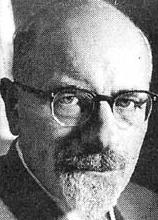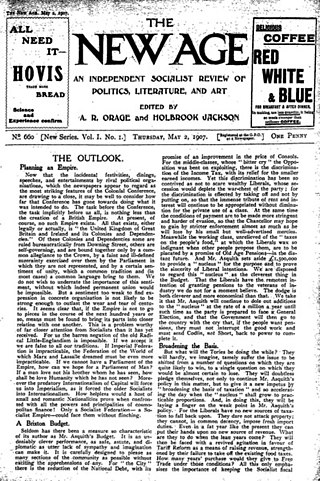Related Research Articles

Eric Arthur Blair, better known by his pen name George Orwell, was an English novelist, essayist, journalist, and critic. His work is characterised by lucid prose, social criticism, opposition to totalitarianism, and support of democratic socialism.

John Boynton Priestley was an English novelist, playwright, screenwriter, broadcaster and social commentator.

George Woodcock was a Canadian writer of political biography and history, an anarchist thinker, a philosopher, an essayist and literary critic. He was also a poet and published several volumes of travel writing. In 1959 he was the founding editor of the journal Canadian Literature which was the first academic journal specifically dedicated to Canadian writing. He is most commonly known outside Canada for his book Anarchism: A History of Libertarian Ideas and Movements (1962).

Isaac Deutscher was a Polish Marxist writer, journalist and political activist who moved to the United Kingdom before the outbreak of World War II. He is best known as a biographer of Leon Trotsky and Joseph Stalin and as a commentator on Soviet affairs. His three-volume biography of Trotsky was highly influential among the British New Left in the 1960s and 1970s.

Percy Wyndham Lewis was a British writer, painter and critic. He was a co-founder of the Vorticist movement in art and edited BLAST, the literary magazine of the Vorticists.

Alfred Richard Orage was a British influential figure in socialist politics and modernist culture, now best known for editing the magazine The New Age before the First World War. While he was working as a schoolteacher in Leeds he pursued various interests, including Plato, the Independent Labour Party and theosophy. In 1900 he met Holbrook Jackson and three years later they co-founded the Leeds Arts Club, which became a centre of modernist culture in Britain. After 1924, Orage went to France to work with George Gurdjieff and was then sent to the United States by Gurdjieff to raise funds and lecture. He translated several of Gurdjieff's works.

Mulk Raj Anand was an Indian writer in English, recognised for his depiction of the lives of the poorer castes in traditional Indian society. One of the pioneers of Indo-Anglian fiction, he, together with R. K. Narayan, Ahmad Ali and Raja Rao, was one of the first India-based writers in English to gain an International readership. Anand is admired for his novels and short stories, which have acquired the status of classics of modern Indian English literature; they are noted for their perceptive insight into the lives of the oppressed and for their analysis of impoverishment, exploitation and misfortune. He became known for his protest novel Untouchable (1935), followed by other works on the Indian poor such as Coolie (1936) and Two Leaves and a Bud (1937). He is also noted for being among the first writers to incorporate Punjabi and Hindustani idioms into English, and was a recipient of the civilian honour of the Padma Bhushan.

Partisan Review (PR) was a left-wing small-circulation quarterly "little magazine" dealing with literature, politics, and cultural commentary published in New York City. The magazine was launched in 1934 by the Communist Party USA–affiliated John Reed Club of New York and was initially part of the Communist political orbit. Growing disaffection on the part of PR's primary editors began to make itself felt, and the magazine abruptly suspended publication in the fall of 1936. When the magazine reemerged late in 1937, it came with additional editors and new writers who advanced a political line deeply critical of Joseph Stalin's Soviet Union.

John Middleton Murry was an English writer. He was a prolific author, producing more than 60 books and thousands of essays and reviews on literature, social issues, politics, and religion during his lifetime. A prominent critic, Murry is best remembered for his association with Katherine Mansfield, whom he married in 1918 as her second husband, for his friendship with D. H. Lawrence and T. S. Eliot, and for his friendship with Frieda Lawrence. Following Mansfield's death, Murry edited her work.
Maurice John Cowling was a British historian. A fellow of Peterhouse, Cambridge, for most of his career, Cowling was a leading conservative exponent of the 'high politics' approach to political history.
Philip Mairet was a British designer, writer and journalist. He had a wide range of interest: crafts, Alfred Adler and psychiatry, and Social Credit. He translated major figures including Jean-Paul Sartre. He wrote biographies of Sir Patrick Geddes and A. R. Orage, with both of whom he was closely associated, as well as of John Middleton Murry. As editor of the New English Weekly in the 1930s, he championed both Christian socialism, as it was known at the time, and ideas on agriculture that would come together later as organic farming.

The New Age was a British weekly magazine (1894–1938), inspired by Fabian socialism, and credited as a major influence on literature and the arts during its heyday from 1907 to 1922, when it was edited by Alfred Richard Orage. It published work by many of the chief political commentators of the day, such as George Bernard Shaw, H. G. Wells, Hilaire Belloc, G. K. Chesterton and Arnold Bennett.
The Fortnightly Review was one of the most prominent and influential magazines in nineteenth-century England. It was founded in 1865 by Anthony Trollope, Frederic Harrison, Edward Spencer Beesly, and six others with an investment of £9,000; the first edition appeared on 15 May 1865. George Henry Lewes, the partner of George Eliot, was its first editor, followed by John Morley.
The Criterion was a British literary magazine published from October 1922 to January 1939. The Criterion was, for most of its run, a quarterly journal, although for a period in 1927–28 it was published monthly. It was created by the poet, dramatist, and literary critic T. S. Eliot who served as its editor for its entire run.
Reynold's News was a Sunday newspaper in the United Kingdom, founded as Reynolds's Weekly Newspaper by George W. M. Reynolds in 1850, who became its first editor. By 1870, the paper was selling more than 350,000 weekly copies. George died in 1879, and was succeeded as editor by his brother, Edward Reynolds.

The bibliography of George Orwell includes journalism, essays, novels, and non-fiction books written by the British writer Eric Blair (1903–1950), either under his own name or, more usually, under his pen name George Orwell. Orwell was a prolific writer on topics related to contemporary English society and literary criticism, who has been declared "perhaps the 20th century's best chronicler of English culture." His non-fiction cultural and political criticism constitutes the majority of his work, but Orwell also wrote in several genres of fictional literature.

Nineteen Eighty-Four is a dystopian novel and cautionary tale by English writer George Orwell. It was published on 8 June 1949 by Secker & Warburg as Orwell's ninth and final book completed in his lifetime. Thematically, it centres on the consequences of totalitarianism, mass surveillance and repressive regimentation of people and behaviours within society. Orwell, a democratic socialist, modelled the authoritarian state in the novel on the Soviet Union in the era of Stalinism, and Nazi Germany. More broadly, the novel examines the role of truth and facts within societies and the ways in which they can be manipulated.
NOW was a British political and literary periodical founded in 1940 by George Woodcock, its first editor, from 1940 to 1941, and by Freedom Press from 1943 to 1947.

Douglas Kerr is a British writer and academic who is best known for his work on Arthur Conan Doyle and George Orwell.
William Travers Symons (1879–1976) was an English Social Credit and Christian Socialist writer, known as a member of the Chandos Group and journal editor.
References
- ↑ TIME - May 16, 1932
- ↑ The Cambridge Introduction to George Orwell. Cambridge University Press. 2012. p. 17.
- ↑ Cox, Michael, editor, The Concise Oxford Chronology of English Literature, Oxford University Press, 2004, ISBN 0-19-860634-6